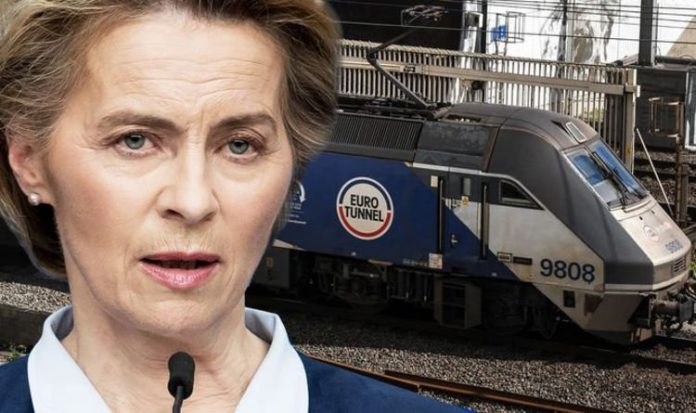The Government has challenged previous commitments with the European Union, increasing the odds of a no deal outcome at the end of the transition period. Both sides have said they remain in close contact and are still planning to have another round of trade talks. However, the EU has made it clear that it cannot sign new trade arrangements if the UK violates previous already-legislated commitments.
MPs have already cleared the first legal hurdle in implementing the Internal Market Bill — a set of new laws that, if passed in both chambers, would breach international law.
The EU has asked the UK to amend the Bill as soon as possible and warned that if it fails to do so, it will likely challenge the UK government in court.
However, Prime Minister Boris Johnson believes the new legislation will “ring-fence” the withdrawal agreement and ultimately stop the EU from “making abusive or extreme interpretations of the provisions”.
Appearing before the Commons Liaison Committee, Mr Johnson was also asked if he thought the EU were negotiating in “good faith”, to which he replied: “I don’t believe they are.”
As tensions are set to rise in the incoming days, a recent report by a civil servant close to the negotiations suggests Mr Johnson might have been right to not believe in the “good faith” of the bloc.
Caroline Bell explained for Briefings for Britain: “With all the hubbub and acrimony last week surrounding the introduction of the Internal Market Bill, political commentators appear to have overlooked a significant decision by the European Council on September 9, which opens up a new front in the Brexit war.
“This time the assault is underground as well as underhanded, with the EU seeking to override the legal integrity and sovereignty of the United Kingdom through the innocuous sounding issue of safety in the Channel Tunnel.”
The European Council’s decision is quoted as saying: “The EU is working on legislation to ensure the safe and efficient operation of the Channel Tunnel railway connection between continental Europe and the United Kingdom (Channel Fixed Link) after the end of the Brexit transition period. Today, the Council’s Permanent Representatives Committee agreed on a negotiation mandate on two proposals aimed at maintaining a single safety authority, which would continue to apply the same set of rules over the whole infrastructure, including in its section under UK jurisdiction.
“Under the Council mandate, France will be empowered to negotiate an amendment to the Canterbury Treaty and the EU railway safety and interoperability rules will be amended so that the Intergovernmental Commission can be maintained as the safety authority competent for the application of EU law within the Channel Fixed Link.
“The draft regulation amending the safety and interoperability provisions will be split into two draft regulations, in order to amend the Statute of the European Court of Justice in a manner that respects the Court’s prerogatives while avoiding a delay in the start of the negotiations.”
JUST IN: Canada’s turbot WAR with EU sets example for Britain
Ms Bell claimed this is a power grab by the EU, which seeks to usurp a bilateral arrangement that is sound in international law in order to be able to impose EU regulation and the jurisdiction of the European Court of Justice in the UK.
The UK’s only other international rail service is between Northern Ireland and Ireland, and there the Irish government has announced that both railway authorities “have put in place all the necessary arrangements to ensure continuity of rail passenger services, in association with the relevant regulatory authorities and in full compliance with the legal requirements applicable in both the European Union and the United Kingdom”.
She noted: “The ambitions behind the Council’s decision of September 9 are clearly exposed by no deal planning for operational continuity in the Channel Tunnel post-Brexit. In February 2019, the French government published a decree which flatly contradicts the EU’s current position.
“Even the EU’s Brexit readiness notice on rail transport published as recently as August 19, 2020 acknowledges that the international railway convention will apply to the Channel Tunnel.”
Ms Bell then asked: “So what changed between the publication of this notice on August 19 and the decision of September 9? Quite a lot in Brexit terms: the Government setting a deadline for trade talks to end and introducing a Bill to frustrate the EU’s attempt to hold Northern Ireland hostage in order to impose its writ in the UK.”
DON’T MISS:
Boris Johnson should ‘scrap WHOLE withdrawal agreement’ [EXCLUSIVE]
Why Michel Barnier is ‘completely wrong’ about international law [REVEALED]
EU ‘broke international law by funding illegal West Bank projects’ [INSIGHT]
Railway safety is admittedly an unusual place to start a legal coup, the civil servant noted.
However, the potential for imposing new EU technical standards, restrictions, conditions of carriage, health and safety rules, employment laws for train crew etc. is huge.
She concluded: “It is almost inevitable that such rules would be fixed to lock British companies out of the market to maintain and replace rolling stock and infrastructure. Technical standards are very effective as non-tariff barriers, and cover every tiny element of the railway – the scope for a very unlevel playing field against British firms is doubtless why the EU wishes to interpose itself into a treaty where it has no right and no need to be.
“The British government should rely on the no deal position for the Channel Tunnel and refuse to divert from international law – there is rather a nice irony in that, in view of the howls from Brussels about the Internal Market Bill.
“Agreeing to renegotiate the Treaty of Canterbury to enforce new EU law and the jurisdiction of the ECJ over the Channel Tunnel would be to repeat the Trojans’ error in flinging open the gates of Troy to the Greeks’ infamous wooden horse.
“The EU must not be allowed to create another version of the Northern Ireland Protocol under the white cliffs of Dover.”







